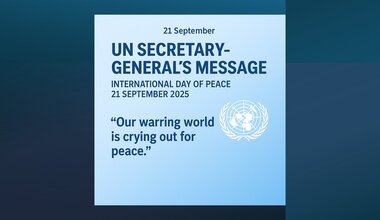UNOAU participates in Lessons Learned Exercise on AMISOM
On 6 September, UNOAU participated in a Lessons Learned Exercise focused on the African Union Mission in Somalia (AMISOM), covering the 15 years of its operations prior to its passage and the establishment of the Africa Transition Mission in Somalia (ATMIS)in 2022.
The exercise was facilitated by the Training for Peace (TfP) Programme through the Norwegian Institute of International Affairs (NUPI). Overall, the exercise was aimed at identifying and documenting lessons and best practices from AMISOM that can contribute to AU Peace Support Operations (PSOs) in the future. The specific objectives of the exercise were to: a) review, identify, and document the achievements, challenges, lessons, and good practices of AMISOM in the implementation of its mandate over its 15 years of operations; b) document how the civilian, military, and police components of AMISOM implemented their mandates and tasks and the Mission Support model used to capture good practices that can inform future AU PSOs; c) provide recommendations to improve the effectiveness and sustainability of future AU PSOs on the continent. The UNOAU team was led by the Deputy Head of Office and Director of Political Affairs, Mr. Gerald Mitchell.
During the meeting, discussions focused on the establishment of AMISOM, its structure, and the initiation of UN logistics support to the mission. UNOAU provided some historical background on the establishment of AMISOM, citing the relevant AU Peace and Security Council (PSC) Communiqués and UN Security Council (UNSC) Resolutions. It was noted that the UN support was provided following a formal request from the AU for financial and logistics support to AMISOM, and this led to the establishment of the United Nations Support Office for AMISOM in Somalia (UNSOA)in 2009. It was further noted that the AU in its Communiqué on the establishment of AMISOM requested that the UN should take over the mission after 6 months, while the subsequent UNSC Resolution noted this request, and further requested the UN Secretary-General to continue to monitor the situation to assess if the conditions would be ripe for a UN Peacekeeping Operation (PKO); however, those conditions never materialized. Discussions also recounted that the AMISOM mandate, although limited in scope, met the immediate AU objectives.
UNOAU underscored the important role that AMISOM played in enabling a safer environment under challenging circumstances for both the government and international organizations to function, facilitating mandate delivery of the United Nations Support Office in Somalia (UNSOM). The Lessons Learned exercise concluded with final considerations on the importance of the enhanced UN-AU Partnership and the need for both organizations to work together to prevent crisis through early consultations and joint planning. Participants also agreed in underscoring that the establishment of an effective UN-AU coordination mechanism is key in ensuring coherence and early response based on division of responsibilities, comparative advantage, and complementarity.
 UN
UN





